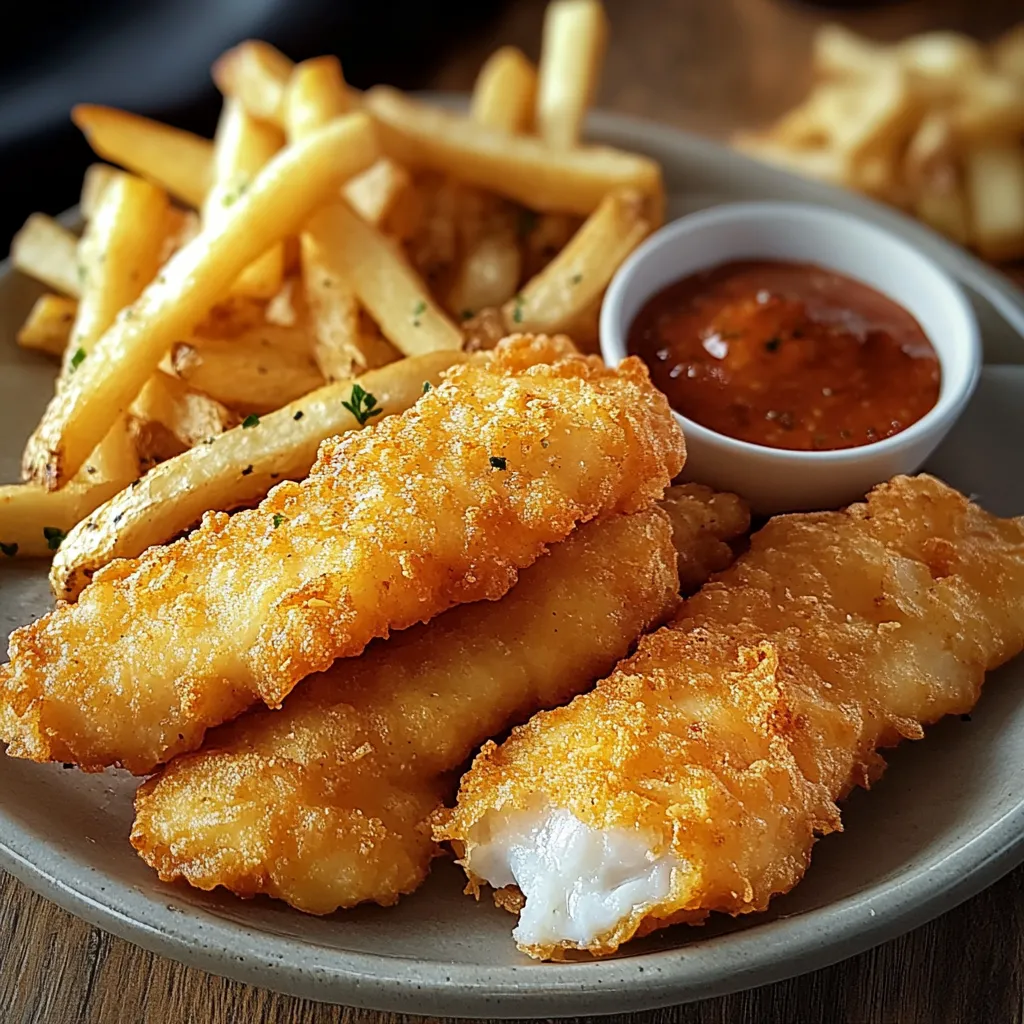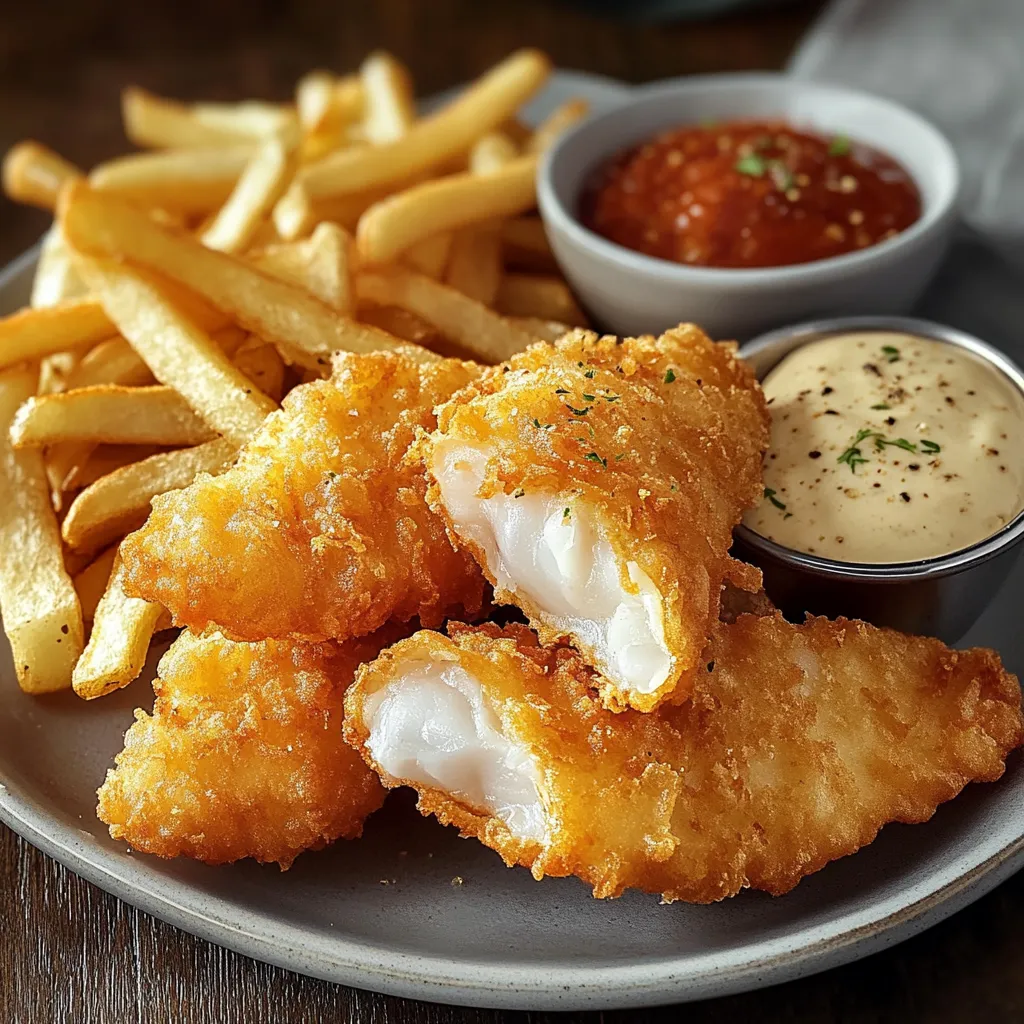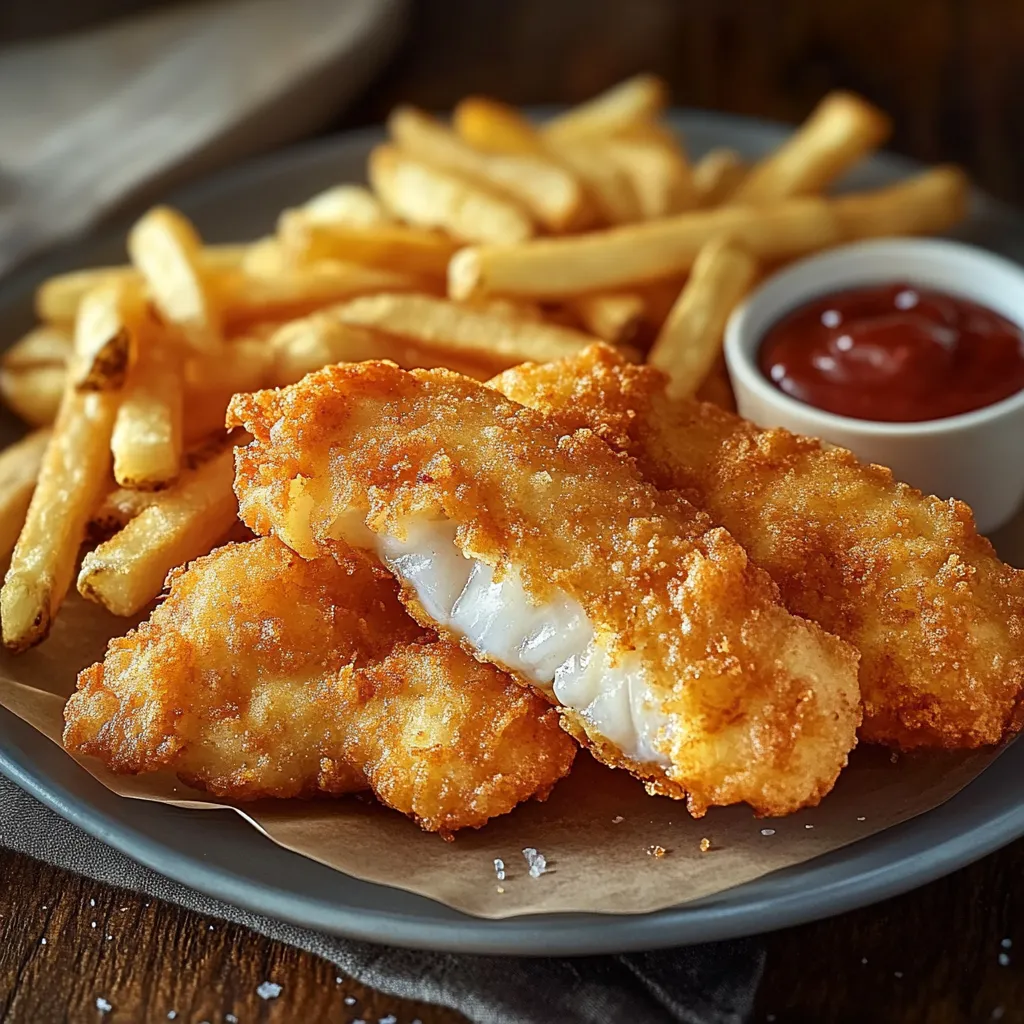 Pin it
Pin it
This crispy fish and chips recipe brings the British pub classic right to your kitchen with perfectly golden-battered fish and double-fried chips that are fluffy inside and crunchy outside.
I perfected this recipe after years of disappointing takeout that arrived soggy and greasy. Now my family gathers around the table on Friday nights, eagerly waiting for that first satisfying crunch.
Ingredients
- Fresh white fish fillets (cod or haddock): Chosen for their firm texture and mild flavor that pairs perfectly with the crispy coating
- All purpose flour: Creates the foundation for our light and crispy batter
- Baking powder: Helps the batter rise and become airy when it hits the hot oil
- Cold sparkling water: My secret weapon for achieving the lightest possible batter
- Russet potatoes: Ideal for chips thanks to their high starch content that creates a fluffy interior
- Vegetable oil: With a high smoke point ensures proper frying without burning
Step-by-Step Instructions
- Prepare the Potatoes:
- Cut your potatoes into uniform thick strips about ½ inch wide. Rinse them thoroughly under cold running water for at least 1 minute to remove excess starch that would make them soggy. Pat them completely dry with paper towels or a clean kitchen towel as any moisture will cause dangerous splattering in the hot oil.
- First Fry for Chips:
- Heat your oil to exactly 325°F in a heavy bottomed pot. Working in small batches to maintain oil temperature, gently lower potato strips into the oil. Cook for precisely 4 minutes until they are soft but still pale. This critical first fry cooks the interior without browning the exterior. Remove with a slotted spoon and drain on paper towels.
- Create the Perfect Batter:
- In a large mixing bowl, combine flour, baking powder, paprika, and a generous pinch of salt. Make a well in the center and pour in ice cold sparkling water. Whisk gently until just combined with a few small lumps remaining. Overmixing will develop gluten and create a tough coating.
- Coat and Fry the Fish:
- Pat fish pieces completely dry with paper towels and season with salt and pepper. Holding each piece by one end, dip into the batter, allowing excess to drip back into the bowl for 2 seconds. Carefully lower into 375°F oil away from you to prevent splashing. Fry for 4 minutes until deeply golden and crispy, turning once halfway through.
- Final Fry for Chips:
- Increase oil temperature to 375°F. Return the par cooked potatoes to the oil in small batches for their second fry. Cook for exactly 3 minutes until they turn golden brown and develop a satisfying crunch. Immediately transfer to paper towels and sprinkle generously with salt while still hot.
- Serve Immediately:
- Arrange fish and chips on plates or in paper lined baskets. Garnish with a sprinkle of fresh parsley and serve with tartar sauce or traditional malt vinegar. The perfect bite combines the crunch of the batter with the tender fish inside.
 Pin it
Pin it
The sparkling water in the batter is truly transformative. I discovered this trick years ago while visiting a small seaside shop in Cornwall. The proprietor, who had been making fish and chips for over 40 years, swore that the bubbles create microscopic pockets of air that expand in hot oil, creating that perfect light texture we all crave.
The Secret to Non Greasy Results
The key to non greasy fish and chips lies in oil temperature. Use a kitchen thermometer to maintain exactly 375°F during frying. When food enters oil below this temperature, it absorbs more grease. Too hot, and the outside burns before the inside cooks. I keep a separate batch of oil ready in case the temperature drops too much between batches.
Traditional Serving Suggestions
In Britain, authentic fish and chips comes wrapped in newspaper with a sprinkle of malt vinegar and salt. Create this experience at home by lining serving plates with parchment paper. Accompany with mushy peas made by simmering frozen peas with butter and mint for the full British chippy experience. Some regions serve with curry sauce or gravy instead of tartar sauce.
Make Ahead Tips
While fish and chips are best eaten immediately, you can prepare components ahead. Cut potatoes can sit in cold water in the refrigerator for up to 24 hours. The first fry of the chips can be done earlier in the day with the potatoes refrigerated until the final fry just before serving. The batter should always be made fresh, as the bubbles from the sparkling water dissipate over time.
 Pin it
Pin it
There's nothing more satisfying than making perfect fish and chips at home. Enjoy every bite!
Frequently Asked Questions
- → What type of fish works best for fish and chips?
Cod and haddock are traditional and work beautifully due to their firm texture and mild flavor. Other good alternatives include pollock, halibut, or flounder. The key is choosing a white fish with firm flesh that can withstand frying without falling apart.
- → Why use sparkling water in the batter?
Sparkling water (or club soda) creates bubbles in the batter that expand when they hit the hot oil, resulting in a lighter, crispier coating. The carbonation also inhibits gluten formation, preventing the batter from becoming tough or chewy.
- → Why do you fry the chips twice?
Double-frying creates the perfect chip - the first fry at a lower temperature cooks the potato through, while the second fry at a higher temperature creates the crispy exterior. This method ensures chips that are fluffy inside and crunchy outside.
- → How can I keep fish and chips crispy until serving?
Place fried fish and chips on a wire rack over a baking sheet in a warm oven (200°F/95°C) instead of on paper towels. This allows air to circulate, preventing the steam from making them soggy while keeping them warm.
- → What oil is best for frying fish and chips?
Neutral oils with high smoke points work best. Vegetable, canola, or peanut oil are excellent choices. Traditional fish and chip shops often use beef tallow for authentic flavor, but vegetable oil is more common for home cooking.
- → Can I make the batter ahead of time?
For best results, prepare the batter just before frying. The carbonation from the sparkling water dissipates over time, and the batter may become dense. If needed, you can mix the dry ingredients ahead and add the cold sparkling water just before cooking.
